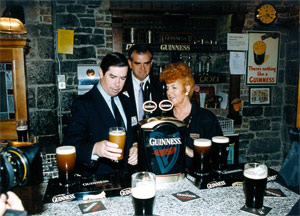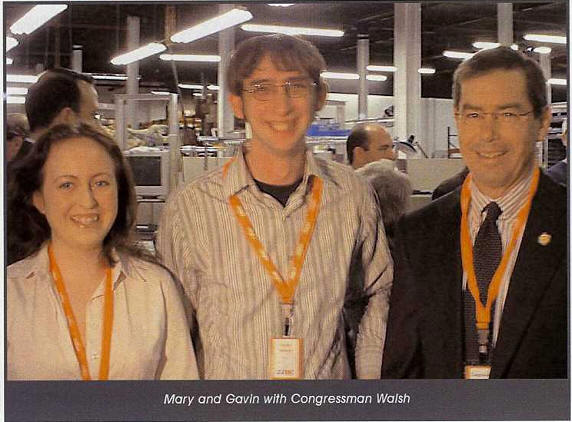Irish Affairs
Overview
Congressman James
T. Walsh was Chairman of the bi-partisan Ad
Hoc Committee for Irish Affairs. During
1990's Congressman Walsh was in contact with
President
Bill Clinton, British Prime Minister John Major, and other influential
political leaders who were involved in the
on-going peace process in Northern Ireland.
|
Walsh supported permanent peace and
an immediate end to the violence against
Irish-Catholic communities done by the
majority Protestant communities in Northern
Ireland; Walsh was an Irish Catholic
himself. Below is a brief history of the Catholic Protestant
conflict, an introduction to the Walsh Visa, as well as a few of
the letters contained in the James T. Walsh
Archives supporting the peace effort. |
 |
A Brief
History surrounding the Protestant Catholic conflicts in Ireland
The conflict between Irish-Catholics and
Protestant-Catholics came from the difference of opinion as to what
involvement the British should have in Ireland. Irish Catholics, who
were mostly located in southern Ireland, wanted complete control of an Ireland free from all
British interference. Irish Protestants in the northern part of Ireland
were in favor of limited British control fearing life in a country with a Catholic majority.
|
Throughout the Twentieth Century there were violent
outbreaks between the two parties. In 1922 the southern colonies of
Ireland became independent and the northern colonies of Ulster remained under
British control as the protestants were the majority of the population.
However, inter-religious violence continued in the north. Various peace
initiatives were on-going to come to a solution in Northern Ireland. This was an
important
foreign affairs issue during the Clinton Administration. A number
of political figures such as George Mitchell, who mediated the peace
meetings, and James Walsh, who's Walsh Visa aimed at helping the youth
in Ireland to mold them into conscious participating citizens, became
well known for their efforts. The peace process resulted in an historic landmark
agreement known as the
Good Friday
Agreement. It included assurances that all communities would
participate in the governing of the north, called for an end to territorial
claims by the Republic of Ireland in the north, and established cooperative
organizations including the north and south and the Great Britain and Ireland. |
 |
The Walsh Visa
|
The
Walsh
Visa program is also known as the
Irish Peace Program. The goal
is to build upon and create a
program meaningful employment
experiences enriched by a holistic
approach to ensure a successful
model for training, cultural,
social, and educational experiences
for the participants in this
program. |

The
Walsh Visa Pioneer was a
newsletter concerned with updating
people about the status of the
program in various regions where it
was being implemented |
"A
program designed to help these young
people develop job skills and
conflict resolution abilities, so
they can better contribute to the
economic regeneration of their home
countries and their establishment of
lasting peace."
-U.S. Department of State, Office of
the Spokesman. "First 'Walsh
Visa' Recipients Arrive in U.S. for
Job Training Designed to Support
Northern Ireland Peace Process."
March 29, 2000. #2000
|
Archive Highlights
This is a sample of the letters contained in the
Walsh Archives, between Congressman Walsh
and influential political figures of the
time, concerning the on-going goal of Peace
in Northern Ireland and the progress being
made.
 | July 24,
1996
 | Letter
to Secretary of State Warren
Christopher from Benjamin A. Gilman,
Chairman Committee on International
Relations and Christopher H. Smith,
Chairman Subcommittee on
International Operations and Human
Rights.
 |
Subject Matter:
The Violence in Northern Ireland
against some Catholic minority
communities. |
|
|
 |
July 23,
1996
 | Letter
to the Right Honorable John Major,
Prime Minister, the British Embassy,
from members of the House of
Representatives, John T. Walsh
signed off.
 |
Subject Matter:
Writing to express deep concern
over the violence in Northern
Ireland and the peace progress.
|
|
|
 |
July 26,
1996
 | Letter
to Congressman James T. Walsh from
John Kerr, Ambassador to the British
Embassy.
 |
Subject Matter:
Writing on behalf of the Prime
Minister of Great Britain
concerning the peace efforts in
Northern Ireland. |
|
|
 | July 21,
1995
 | Letter
to John Simmons from Edward Kennedy,
with the support of Congressman
Walsh.
 |
Subject Matter:
This is a letter urging Simmons
to sign a letter to Newt
Gingrich asking him to invite
Irish President Mary Robinson to
Congress. |
|
|
 | May 5, 1995
 | Letter
To John Simmons from Brian O'Connor,
Joe Kennedy and Representative
Walsh.
 |
Subject Matter:
Letter concerning the US Ireland
Technology Fund. |
|
|
 |
January 20,
1995
 | Letter
from President Bill Clinton to
Congressman Walsh.
 |
Subject Matter:
Clinton responding to a previous
letter from Walsh addressing the
peace process in Northern
Ireland. |
|
|
 | November 16,
1995
 | Letter
from the leaders of the bi-partisan
Ad Hoc Committee for Irish Affairs,
including Chairman of the committee,
James Walsh, to President Bill
Clinton.
 |
Subject Matter:
Letter concerning the stalemate
in the peace process in Northern
Ireland and the opportunity for
President Clinton to help
contribute to the peace process
in his upcoming trip to Great
Britain. |
|
|
|